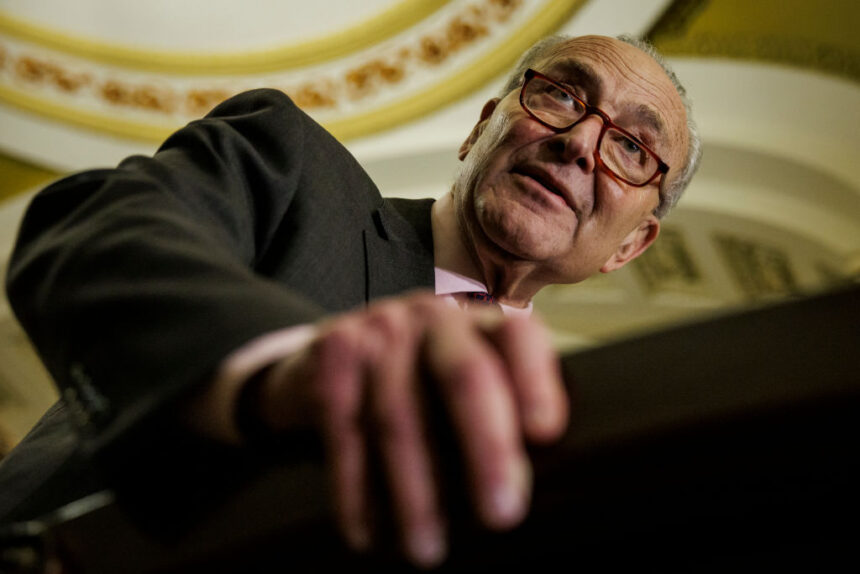A call from Senate Majority Leader Chuck Schumer, (D-N.Y.), for a federal crackdown on teenage use of Zyn nicotine pouches has spawned an online ‘Zynsurrection’ from Republican lawmakers, conservative pundits and users defending the products.
Earlier this week, Schumer urged the Food and Drug Administration as well as the Federal Trade Commission to take action against the popular nicotine pouches, echoing the ongoing regulatory battles over the marketing of e-cigarettes and vapes.
“Amid federal action against e-cigs and their grip on young people, a quiet and dangerous alternative has emerged and it is called Zyn,” he said in a statement. “I am delivering a new warning to parents because these nicotine pouches seem to lock their sights on teens and use social media to hook them.”
He added that Zyn is a “pouch full of problems” and predicted they will become the next “trend in addiction for teens.”
Much like Juul has become synonymous with vaping, Zyn has become the name brand for nicotine pouches and is only continuing to rise as a presence.
The statistics back it up: during Q3 2023, Zyn nicotine pouch shipment volume in the U.S. totaled 105.4 million cans, representing 65.7% year-over-year growth. Even Vice deemed Zyn the “the surprise nicotine hit of 2023.”
Zyn also enjoys considerable institutional backing. In late 2022, tobacco company Philip Morris International (PMI) purchased 93% of shares in Swedish Match, the parent company of Zyn. Similar to how Altria Group bought a sizable stake in Juul as a way to gain a foothold in the e-cigarette market, PMI did the same for nicotine pouches and expects to continue reaping the benefits.
“This reflects continued excellent business momentum, driven by strong IQOS performance, resilient combustible trends and the exceptional growth of Zyn, which has surpassed our expectations yet again,” PMI CEO Jacek Olczak said in a statement accompanying the October earnings report.
Speaking on behalf of its affiliates, PMI issued a statement asserting the company meets and exceeds the regulations governing the industry.
“Our marketing practices—which prohibit the use of social media influencers—are focused on preventing underage access and set the benchmark for the industry,” the statement read. “Real-world evidence shows this approach is working: the latest data from the Centers for Disease Control and Prevention and the FDA show oral nicotine pouch use by those under the legal age remains exceptionally low.”
Schumer renews public health fight
Ever since the infamous public battles with Big Tobacco companies in the 1990s, lawmakers have eyed ways to cut down on tobacco use, especially among teens and young adults.
Whether that is through designating public smoking areas, proposing bans on menthol cigarettes or the FDA ordering Juul e-cigarettes off the market, the federal government has been active over the past two decades when it comes to combating tobacco usage.
Still, despite those efforts, teens and young adults have found other ways to get their nicotine fix.
A study published by the National Institutes of Health last year indicated that many young people who smoke cigarettes are concurrently using oral nicotine pouches. Data collected from September 2020 to May 2022 also pointed to “stable oral nicotine product use rates” over time among adolescents and young adults.
This challenge to Zyn also calls to mind Schumer’s most recent public health-related battle: caffeinated energy drinks.
In mid-2023, he sent a letter to the FDA calling on the agency to investigate Prime Energy, influencer Logan Paul’s drink brand, due to potentially dangerous levels of caffeine.
“Prime Energy Drink has so much caffeine that it could endanger kids’ health. But it’s being marketed to kids! Parents and pediatricians are worried,” Schumer said in a social media post.
Like Zyn, Prime has accrued a dedicated fanbase of Millennial and Gen Z users — one which made its displeasure with Schumer’s statement loudly known.
The rise of a ‘Zynsurrection’
Shortly after Schumer’s statement was released many Zyn users came forward to defend the product, including several Republican and conservative leaders.
Rep. Marjorie Taylor Greene, (R-Ga.), called for a ‘Zynsurrection’ on X, the social media platform formerly known as Twitter.
Echoing her point, Rep. Kat Cammack, (R-Fla.) and Sen. Markwayne Mullin, (R-OK.), criticized Schumer’s call for a crackdown on nicotine pouches by alleging Democrats and the Biden administration were ignoring the ongoing fentanyl crisis.
Conservative publications also came to Zyn’s defense, with The American Spectator writing that Chuck Schumer will “rue the day he declared war on Zyn,” while the libertarian Reason magazine wrote that he attacked “lifesaving” nicotine pouches.
One user even compared Schumer’s efforts to that of Julius Caesar’s point of no return.
“Mr. Schumer, this will be your one and only warning on behalf of all the fellas: Do not cross that Rubicon,” warned Greg Price, the communications director for the State Freedom Caucus Network, a 501(c)(4) conservative organization. “You will have reaped the whirlwind and you will pay the price.”
By Thursday, the Zyn controversy had transformed from public health debate to online irony, with ‘Zynsurrection’ earning an explainer page on KnowYourMeme.
This article has been updated to include a comment from Philip Morris International.








